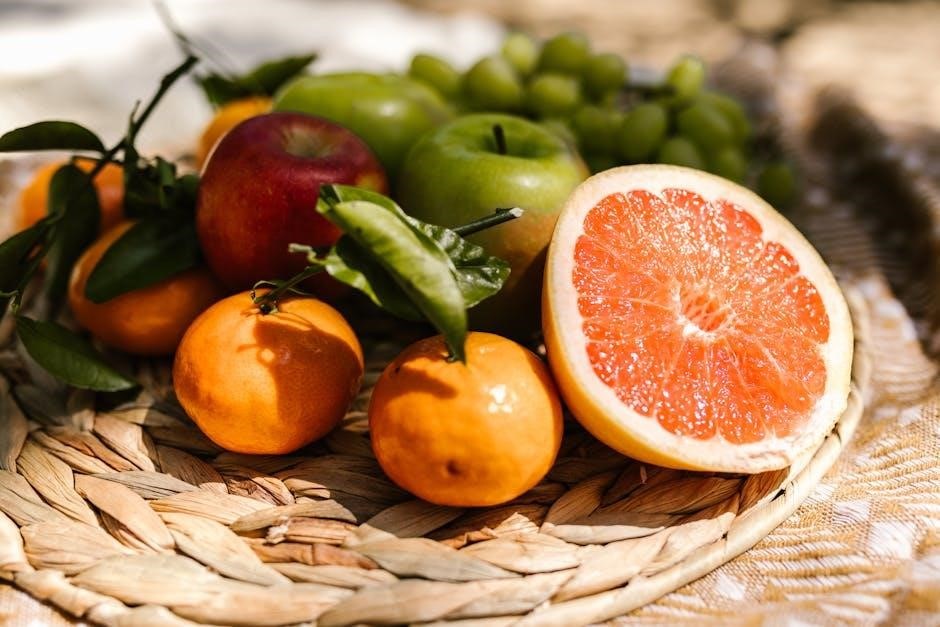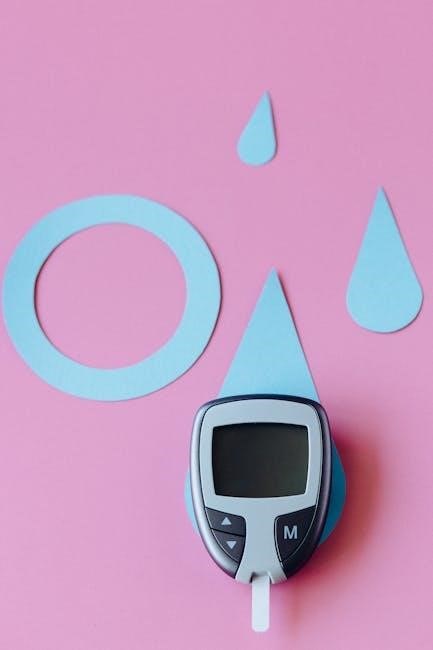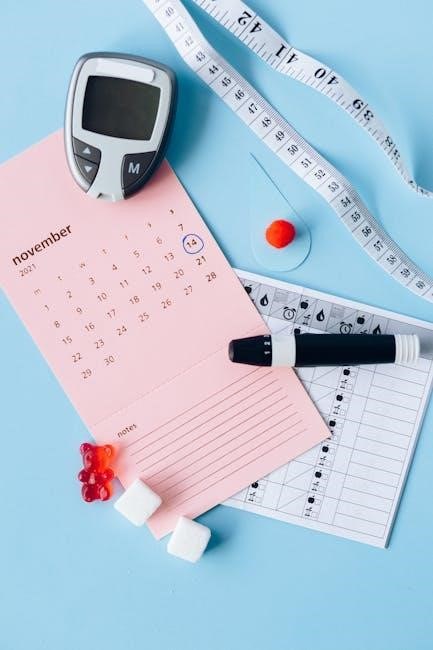A structured 21-day diet plan offers a balanced approach to weight loss and improved well-being, focusing on sustainable practices and nutrient-rich meals to support long-term health goals effectively․
Overview of the 21-Day Diet Plan
The 21-Day Diet Plan is a structured program designed to promote weight loss and improve overall health through balanced nutrition․ It focuses on daily meal plans, portion control, and hydration, with a weekly breakdown that includes detox, nutrient-rich foods, and maintenance phases․ The plan emphasizes whole foods, fiber, and protein while avoiding processed items․ It also encourages meal prepping and physical activity to support sustainable results and long-term health benefits․
Importance of a Structured Diet Plan
A structured diet plan provides clarity and direction, helping individuals stay consistent with their health goals․ It ensures proper nutrition, portion control, and balanced meals, reducing the risk of unhealthy choices․ A clear plan also saves time, minimizes decision fatigue, and promotes accountability․ For a 21-day program, structure is key to achieving measurable results and fostering sustainable habits that extend beyond the diet period․
Benefits of a 21-Day Duration
The 21-day duration is ideal for kickstarting meaningful changes in eating habits and metabolism․ It’s long enough to notice significant improvements in energy levels, digestion, and weight loss but short enough to maintain motivation․ This timeframe also aligns with the body’s natural adaptation cycle, making it easier to transition into healthier routines that can be sustained beyond the initial three weeks․

Daily Structure of the 21-Day Diet Plan
The plan emphasizes a balanced routine, with three main meals and two snacks daily, focusing on hydration and portion control to support metabolism and energy levels․
Breakdown of Daily Meals and Snacks
Each day includes three nutritious meals and two snacks, carefully planned to provide balanced nutrition․ Breakfast options feature protein-rich foods like eggs and Greek yogurt, while lunches and dinners focus on lean meats, whole grains, and colorful vegetables․ Snacks are designed to curb hunger, offering healthy choices such as fruits, nuts, and veggie sticks with dips․ This structure ensures sustained energy and reduces cravings, promoting overall well-being․
Portion Control and Caloric Intake
Portion control is essential to manage hunger and prevent overeating․ Meals are designed with balanced macronutrients, ensuring adequate protein, healthy fats, and complex carbs․ Caloric intake is tailored to support weight loss while maintaining energy levels․ Smaller, frequent meals help regulate metabolism and keep cravings at bay, promoting a steady calorie burn throughout the day․
Hydration and Its Role in the Diet Plan
Staying hydrated is vital for metabolism, digestion, and overall health․ Drinking plenty of water throughout the day boosts energy levels and supports weight loss by enhancing fat burning․ Incorporating herbal teas and water-rich foods like cucumbers and oranges can help meet daily hydration goals․ Aim for at least eight glasses of water daily to optimize the diet plan’s effectiveness and maintain bodily functions efficiently․
Weekly Breakdown of the Diet Plan
The 21-day diet plan is divided into three distinct weeks, each with specific goals: detox, nutrient-rich eating, and maintenance․ This structured approach ensures gradual, sustainable progress toward health and weight loss objectives․
Week 1: Detox and Cleanse
Week 1 focuses on eliminating toxins and cleansing the body․ It involves consuming detoxifying foods like leafy greens, citrus fruits, and herbal teas․ The diet emphasizes hydration to flush out harmful substances, while minimizing processed foods and sugars․ This phase prepares the body for healthier eating habits by resetting metabolism and improving digestive function․ It sets the foundation for the next stages of the diet plan․
Week 2: Incorporating Nutrient-Rich Foods
Week 2 introduces nutrient-dense foods to replenish vitamins and minerals․ Emphasize lean proteins, whole grains, and colorful vegetables to boost energy and satisfaction․ Healthy fats like avocados and nuts are added for sustained vitality․ This phase focuses on balancing macronutrients and promoting optimal digestion․ By incorporating variety, the diet becomes more flavorful and satisfying, helping to maintain motivation and support overall well-being during the transition to healthier habits․
Week 3: Maintenance and Sustenance
Week 3 focuses on maintaining progress and sustaining healthy habits․ Emphasize whole, nutrient-dense foods like lean proteins, whole grains, and a variety of colorful vegetables․ Continue to prioritize hydration and mindful portion control․ This phase prepares the body for long-term wellness by reinforcing balanced eating habits and gradual reintroduction of select foods, ensuring a smooth transition to a sustainable lifestyle beyond the 21-day plan․

Key Foods to Include in the Diet Plan
Incorporate a variety of fruits, whole grains, and leafy greens for essential vitamins and minerals․ Nuts and seeds provide healthy fats and protein for energy and satiety․
High-Protein Foods for Satiety
Include lean meats like chicken and turkey, fish such as salmon, and plant-based options like tofu and legumes․ Eggs, Greek yogurt, and nuts are also excellent sources of protein․ These foods help keep you full longer, reducing cravings and supporting weight management․ Protein-rich meals promote satiety by slowing digestion and providing sustained energy, making them a key component of a successful 21-day diet plan․
Fiber-Rich Foods for Digestive Health
Fiber-rich foods like whole grains, fruits, vegetables, and legumes are essential for promoting digestive health; They add bulk to meals, aiding digestion and preventing constipation․ Foods such as oats, quinoa, broccoli, and apples support healthy gut function․ Incorporating these into your diet enhances nutrient absorption and overall well-being, making them a cornerstone of a balanced 21-day diet plan for optimal health outcomes․
Healthy Fats for Energy and Satisfaction
Healthy fats, such as avocados, nuts, seeds, and fatty fish, provide sustained energy and satisfaction․ They support brain function and hormone production while keeping you fuller longer․ Incorporating these fats into meals enhances flavor and nutritional value, making them a vital component of a balanced 21-day diet plan for overall well-being and weight management․

Foods to Avoid During the Diet Plan

Foods to Avoid During the Diet Plan
Eliminate processed foods, sugary snacks, and high-sodium items to avoid hindering weight loss and overall health․ These foods promote inflammation and bloating, derailing progress․
Processed Foods and Sugary Snacks
Processed foods and sugary snacks are high in calories, salt, and unhealthy fats, contributing to weight gain and inflammation․ They often lack essential nutrients, causing energy crashes and hindering diet progress․ Avoid items like chips, candies, and ready-to-eat meals to support your weight loss and overall health goals during the 21-day plan․
High-Sodium Foods and Their Impact
High-sodium foods can lead to bloating, fluid retention, and increased blood pressure, hindering weight loss progress․ Limiting intake of processed meats, canned soups, and salty snacks supports overall health and helps maintain a balanced diet during the 21-day plan, promoting better bodily function and weight management․
Dairy and Gluten: Potential Triggers
Dairy and gluten can trigger inflammation, bloating, or digestive discomfort in sensitive individuals․ Eliminating these during the 21-day plan may improve digestion and reduce inflammation․ Opt for gluten-free alternatives like rice or quinoa and dairy-free options such as almond milk to minimize potential adverse effects and support overall well-being throughout the diet․

Meal Prepping and Planning
Meal prepping and planning are essential for staying organized and committed to your diet․ They save time, reduce stress, and ensure healthy, balanced meals throughout the 21-day plan․
Benefits of Meal Prepping
Meal prepping offers numerous benefits, including time savings, reduced food waste, and consistent nutrition․ It helps maintain portion control, ensures healthy choices, and keeps you on track with your diet goals․ Prepping meals also reduces stress during busy days and promotes better eating habits․ By planning ahead, you can focus on nutrient-dense foods and avoid impulsive, unhealthy decisions․ This strategy is key to sustaining your 21-day diet plan successfully․
Practical Tips for Meal Planning
Start by creating a weekly meal schedule, ensuring variety and balance․ Focus on seasonal ingredients to optimize flavor and cost․ Plan meals that use overlapping ingredients to minimize waste․ Consider your lifestyle, such as work hours or family needs, when selecting recipes․ Keep a list of staple meals that are quick to prepare․ Use weekends for batch cooking or prepping key components like grains or proteins․ This approach ensures consistency and reduces last-minute takeout temptations, keeping your diet on track․
Grocery Shopping List for Success
Stock up on fresh fruits and vegetables, lean proteins like chicken and fish, whole grains, and healthy fats like avocados and nuts․ Include herbs, spices, and low-sugar condiments for flavor․ Don’t forget dairy or dairy alternatives, eggs, and plant-based protein sources․ Keep healthy snacks like nuts, seeds, and whole grain crackers on hand․ Beverages should include water, herbal teas, and low-sugar juices․ Plan your list to ensure variety and minimize waste, tailoring it to your dietary preferences and needs for a balanced 21-day plan․
Physical Activity and the Diet Plan
Physical activity enhances the effectiveness of a 21-day diet plan by boosting metabolism and improving overall health, making it easier to achieve weight loss goals naturally․
Role of Exercise in Weight Loss
Exercise plays a crucial role in weight loss by enhancing metabolism, burning fat, and retaining muscle mass․ It complements the diet plan by increasing energy expenditure and improving overall health․ Regular physical activity boosts metabolic rate, helping the body burn calories more efficiently․ Combining cardio and strength training can optimize results, supporting the dietary efforts to achieve a sustainable weight loss․ Consistency and patience are key to long-term success․
Recommended Daily Activity Levels
Aim for at least 150 minutes of moderate-intensity aerobic exercises, such as brisk walking, cycling, or swimming, weekly․ Incorporate strength training sessions twice a week to build muscle․ Daily activities like walking and light stretching can also contribute to overall fitness․ Consistency is key to achieving and maintaining weight loss goals effectively while supporting the 21-day diet plan’s success․
Workout Routines to Complement the Diet
Incorporate a mix of cardio, strength training, and flexibility exercises to enhance weight loss and overall health․ Aim for 30 minutes of moderate-intensity workouts, such as jogging or cycling, most days of the week․ Add strength training twice a week to build muscle and boost metabolism․ Yoga or Pilates can improve flexibility and reduce stress, ensuring a well-rounded fitness routine that complements the 21-day diet plan effectively․

Mental and Emotional Aspects of Dieting
Dieting often reveals emotional eating patterns and mental challenges․ A positive mindset and stress management are crucial for overcoming these hurdles and achieving lasting success․
Managing Cravings and Emotional Eating
Recognizing emotional triggers and practicing mindful eating are key to managing cravings․ Keep healthy snacks handy and stay hydrated to curb hunger-driven impulses․ Incorporate physical activity to distract from cravings and improve mood․ Building a support system can also help maintain discipline and provide encouragement during challenging moments of the diet journey․
Mindful Eating Practices
Mindful eating involves savoring each bite, recognizing hunger cues, and eating without distractions․ Focus on the taste, texture, and smell of food to enhance satisfaction and reduce overeating․ Practice gratitude for your meals and listen to your body’s signals to ensure a balanced and enjoyable dining experience, fostering a healthier relationship with food and improving overall well-being during the diet plan․
Staying Motivated Throughout the Plan
Tracking progress, setting achievable goals, and celebrating small victories can keep you motivated․ Visual reminders, like a vision board, and supportive communities enhance commitment․ Reward yourself with non-food treats, like new workout gear, to stay encouraged․ Consistency and self-compassion are key to overcoming challenges and maintaining enthusiasm for the 21-day diet plan journey toward healthier habits and lasting results․
Common Challenges and Solutions
Addressing challenges like cravings and plateaus requires strategic planning․ Incorporate healthy alternatives, stay hydrated, and adjust portion sizes to maintain progress and motivation effectively throughout the diet plan․
Dealing with Hunger and Cravings
Managing hunger and cravings is crucial for diet success․ Opt for healthy snacks like fruits, nuts, or veggies to curb hunger․ Stay hydrated, as thirst can mimic hunger․ Incorporate fiber-rich foods to enhance satiety and reduce cravings․ Plan meals in advance to avoid impulsive choices․ Mindful eating and portion control also help in overcoming cravings effectively during the 21-day plan․
Strategies for Staying on Track
Staying consistent with the 21-day diet plan requires discipline and effective strategies․ Meal prepping is key to avoiding unhealthy choices․ Set realistic goals and track progress daily․ Stay hydrated and incorporate physical activity to boost motivation․ Avoid tempting situations and find healthy swaps for cravings․ Celebrate small victories to maintain enthusiasm․ Consistency, even on weekends, ensures long-term success and helps build sustainable habits for a healthier lifestyle․
Overcoming Plateaus in Weight Loss
Plateaus occur when the body adapts to routines․ Adjust caloric intake by modifying portion sizes or meal timing․ Incorporate strength training to build muscle, which boosts metabolism․ Introduce variety in workouts to challenge the body differently․ Stay consistent with hydration and sleep․ Track progress weekly and adjust strategies as needed․ Celebrate small victories to maintain motivation and reaffirm commitment to the diet plan․ Consistency and patience are key to breaking through plateaus․

Post-Diet Plan: Maintaining Results
Maintaining weight loss involves adopting long-term healthy habits, including balanced nutrition, regular physical activity, and mindful eating․ Consistency and self-monitoring are essential for sustaining progress beyond the initial plan․
Transitioning to a Long-Term Healthy Diet
Transitioning to a long-term healthy diet involves maintaining balanced nutrition, incorporating a variety of whole foods, and setting realistic goals․ Gradually reintroducing foods while monitoring portion sizes and overall health helps ensure sustainability․ Regular meal prepping, staying hydrated, and mindful eating practices support lasting results, fostering a healthy lifestyle beyond the initial 21-day plan․
Importance of Regular Health Check-Ups
Regular health check-ups are crucial for monitoring progress and ensuring overall well-being․ They help identify potential issues early, such as nutrient deficiencies or health imbalances․ Blood work, weight measurements, and other assessments provide valuable insights, allowing adjustments to the diet plan․ Consistent check-ups support long-term health goals and prevent complications, ensuring a safe and effective transition to a sustainable lifestyle post-diet․
Sustaining a Healthy Lifestyle Beyond 21 Days
Adopting a long-term approach to health involves integrating mindful eating, regular physical activity, and balanced nutrition into daily life․ Gradual, sustainable changes promote lasting results, reducing the likelihood of rebound weight gain․ Focus on whole, nutrient-dense foods and maintain hydration habits formed during the plan․ Consistency and self-awareness are key to preserving the benefits of the 21-day diet plan and fostering overall well-being for years to come․
The 21-day diet plan provides a structured, balanced approach to achieving health goals, fostering sustainable habits and a mindful relationship with nutrition for lasting well-being and confidence․
Final Thoughts on the 21-Day Diet Plan
The 21-day diet plan is a balanced and structured approach to achieving weight loss and improving overall health․ It focuses on sustainable habits, nutrient-rich meals, and mindful eating practices․ By following this plan, individuals can expect to see noticeable changes in their physical and mental well-being․ The key to success lies in consistency, hydration, and staying committed to the program․ With dedication, the results can be transformative and long-lasting, empowering individuals to maintain a healthier lifestyle beyond the 21 days․
Encouragement for Continued Health Journey
Completing the 21-day diet plan is a remarkable achievement․ Celebrate your dedication and the positive changes you’ve experienced․ Remember, healthy habits are a lifelong journey, not a short-term goal․ Stay committed to nourishing your body and mind, and embrace the transformative benefits of a balanced lifestyle․ Keep pushing forward, and let your progress inspire continued growth and well-being․ Your health journey is just beginning, and the rewards are endless with sustained effort and determination․
Additional Resources
Explore detailed guidebooks and websites offering the 21-Day Diet Plan PDF․ Visit trusted sources like Prostate Cancer UK for comprehensive resources and meal planning guides․
Where to Find the 21-Day Diet Plan PDF
The 21-Day Diet Plan PDF is available on trusted health websites like Prostate Cancer UK and the Health Information Team․ You can also find it on online marketplaces such as Amazon or Google Books․ Many wellness websites offer free downloads, ensuring easy access to structured meal plans and guides․ Additionally, some nutritionists provide companion workbooks or guides to enhance your journey․ Always opt for verified sources for reliability and safety․
Recommended Reading and Websites
For comprehensive guidance, visit trusted websites like Healthline and Mayo Clinic, offering detailed meal plans and expert advice․ Check out Amazon for e-books and guides․ Explore nutrition blogs and wellness platforms for additional resources; Ensure to choose verified sources to guarantee reliable and safe information․ These platforms provide valuable insights and tools to support your 21-day diet journey effectively․

